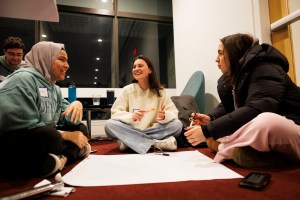Tag: History
-
Nation & World
Redressing five centuries of injustice: A start
On May 4, 1493 — less than a year after Columbus set foot in the New World — Pope Alexander VI issued “Inter Caetera,” a papal bull that still resonates more than five centuries later.
-
Campus & Community
Sen. Edward Kennedy to receive honorary degree at December convocation
Sen. Edward Kennedy will receive an honorary degree from Harvard on Dec. 1 in a special convocation at Sanders Theatre. The honor is in recognition of Kennedy’s lifelong commitment to public service and his tireless efforts as a champion for a range of social issues including health care, civil rights, labor, employment, the environment, and…
-
Arts & Culture
Puzzling through Yeats with Helen Vendler
Helen Vendler knows a thing or two about William Butler Yeats. She has authored three books on the Irish poet’s work, including her most recent volume, “Our Secret Discipline: Yeats and Lyric Form,” published in 2007.
-
Campus & Community
This month in Harvard history
Nov. 14, 1899 — In Sanders Theatre, students, faculty, and administrators celebrate Maj. Henry Lee Higginson’s recent $150,000 gift for building the Harvard Union (now part of Barker Center for the Humanities).
-
Campus & Community
This month in Harvard history
Oct. 26, 1952 — Democratic presidential candidate Adlai Stevenson worships at the First Parish Church in Harvard Square and visits President James Bryant Conant afterwards in Massachusetts Hall.
-
Nation & World
Nunn wants to eliminate nukes
Sam Nunn, former Democratic senator from Georgia (1973-97), is well known as an eminence in the realm of U.S. security policy.
-
Campus & Community
This month in Harvard history
Oct. 15, 1945 — Pulitzer Prize-winning History Professor Paul Herman Buck, PhD ’35, becomes Harvard’s first Provost. Under the terms of the statutory amendment approved on this day by the Board of Overseers, the Provost is also, ex officio, Dean of the Faculty of Arts and Sciences (the position Buck has held since 1942).
-
Campus & Community
Center for European Studies welcomes its fall fellows
The Minda de Gunzburg Center for European Studies (CES) has announced the arrival of its 2008 fall fellows. The CES is dedicated to fostering the study of European history, politics, and society at Harvard, and selects visiting scholars that will play an active role in the intellectual life of the CES and the University. While…
-
Health
Reading human history in the bones of animals
In a Siberian cave Patrick Wrinn found bones: bones of sheep and goats, bones of extinct bison and horses, of mammoths and wooly rhinoceroses. Wrinn, a doctoral student in archaeology at the University of Arizona and member of the Harvard Class of 1998, is trying to find out who — or what — put the…
-
Campus & Community
This month in Harvard history
October 1784 — Harvard awards an honorary Doctor of Laws degree to Maj. Gen. Marie-Joseph-Paul-Yves-Roch-Gilbert du Motier, Marquis de Lafayette.
-
Arts & Culture
Dracula, Romanian revolution onstage at A.R.T.
Thirteen men and women stand in a semicircle. Several of them are wearing hammer and sickle-shaped headdresses. Some are carrying wrenches; others, flowers. They are all singing the refrain “Drac-u-laaa.” And in the center of it all, there is a man, slowly turning, pretending to draw a cape to the tip of his nose.
-
Arts & Culture
Power of the pen in early America
In 1747, three members of the Abenaki Native American tribe and their Mohawk ally posted a petition on a wall of an English fort in the Connecticut River Valley. The paper was small, but it spoke volumes.
-
Campus & Community
This month in Harvard history
Oct. 14, 1763 — At the College library in Old Harvard Hall, Ephraim Briggs, Class of 1764, checks out “The Christian Warfare Against the Deuill World and Flesh” by John Downame, one of several hundred books that John Harvard had bequeathed to the College in 1638.
-
Campus & Community
Program allows gifted scholars to kick back and … work
Abena Dove Osseo-Asare studies African medicinal plants, including their fate at the hands of modern science and global patent systems.
-
Arts & Culture
Key statistical ideas celebrate birthdays
University of Chicago statistics professor Stephen M. Stigler, a frequent visitor to Harvard, has a favorite movie — “Magic Town,” a black-and-white flick from 1947. It stars James Stewart as a pollster who discovers a magical place: a heartland town whose citizens have a range of opinions that are a near-perfect composite of the whole…
-
Nation & World
History of human rights declaration is reviewed at CGIS
In September 1948, representatives of 18 nations at the newly minted United Nations were inspired by the tumult and horror of World War II to create a Universal Declaration of Human Rights (UDHR).
-
Campus & Community
This month in Harvard history
Oct. 17, 1640 — The Great and General Court grants Harvard the revenues of the Boston-Charlestown ferry, which plies the shortest route between Boston and Charlestown, Cambridge, Watertown, Medford, and the plantations of Middlesex County. (From Charlestown, travelers could head for Connecticut.)
-
Campus & Community
And quiet flows the Don at Pusey
The Harvard Map Collection presents its fall exhibition, “From the Amazon to the Volga: The Cartographic Representation of Rivers,” which opened Wednesday (Sept. 24). For centuries, cartographers have wrestled with the difficulties of depicting rivers, and in the process they have devised many ingenious ways of answering the challenge — from streambed profiles to bird’s-eye…
-
Campus & Community
Ken Burns to headline Theodore Roosevelt celebration
Theodore Roosevelt is considered a principal architect of the U.S. national park system. To help mark his 150th birthday this fall, noted filmmaker Ken Burns will come to Harvard to offer remarks and show clips from his upcoming documentary, “The National Parks: America’s Best Idea,” due out in fall 2009. Scheduled for Oct. 3 at…
-
Arts & Culture
Radcliffe Fellow Markovits talks about ‘mad, bad, dangerous’ poet
George Gordon, Lord Byron died in 1824 at the age of 36 — a short life, but long enough for Byron to become a personage so vivid and controversial that he was arguably the modern era’s first celebrity.
-
Campus & Community
Ackerman awarded Golden Lion for contributions to architecture
The 2008 Venice Biennale award committee has conferred on James S. Ackerman, the Arthur Kingsley Professor of Fine Arts Emeritus at Harvard University, its prestigious Golden Lion for Lifetime Achievement. The award citation praised Ackerman’s contributions to architecture, calling him “the doyen of the international community of historians of Renaissance architecture,” adding, “He is one…
-
Campus & Community
Praise and preservation
Harvard University President Drew Faust used the bully pulpit of Appleton Chapel this week (Sept. 16), urging the University’s citizens to act responsibly on environmental matters.
-
Nation & World
U.S. v. Microsoft, 10 years later
At the time, some considered it the trial of the century. The weight of the U.S. government pitted against one of the most influential companies in the world accused of abusing its power and crushing the competition.
-
Campus & Community
This month in Harvard history
Sept. 1, 1922 — The Divinity School and the Andover Theological Seminary formally begin a closer affiliation under a new agreement approved in the spring.


